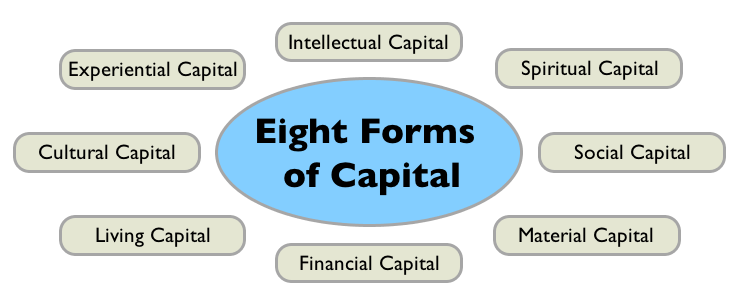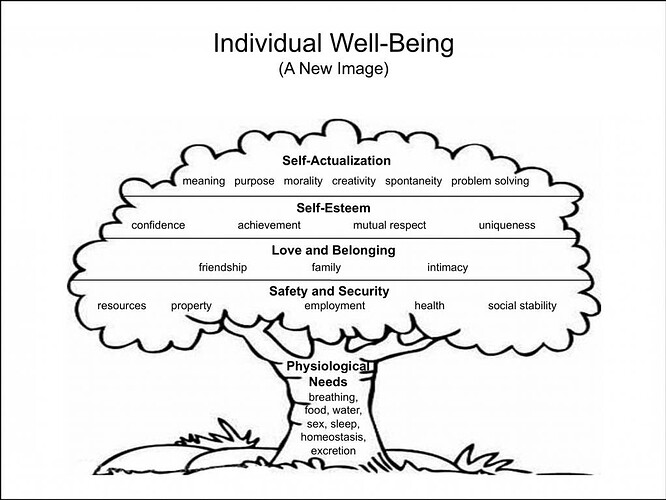In 8 Forms of Capital | AppleSeed Permaculture, there are 8 forms of capital described:
- Material Capital – the raw and processed non-living resources, such as rock, lumber, buildings, tools, fuel, and so forth, as well as stored up goods that our activities generate.
- Intellectual Capital – what we know and have learned; the stored knowledge and ideas that are available to us.
- Experiential Capital – “street smarts” or the “school of hard knocks”, this is the difference between what a novice and a master knows. This is Grandma’s biscuit recipe, for which there is no recipe, only the feel of the dough in the hands.
- Cultural Capital – the shared art, music, myths, stories, ideas, and worldviews of a community; collectively held as a holistic sum of individual beliefs, thoughts and actions.
- Social Capital – the goodwill from others that your service to your community creates, the favors you owe and are owed, and the connections and network that you have.
- Natural Capital – plants, animals, soil, and the collective properties of ecosystems, such as purifying and circulating water and storing nutrients.
- Spiritual Capital – our capacity to live into the fullest, most authentic expression of ourselves, and our ability to connect with and receive guidance from something greater than ourselves.
- Financial Capital – the money, currency and other financial assets we have acquired.
How does this apply to SoFA? I’ll give you my personal list.
- Material Capital – well, that’s the zoom rooms, the forum, the website, all the different services we own together. In my case, it’s also my only source of income. All my teaching/consulting money goes into SofA, and SoFA pays me a part of that as my salary.
- Intellectual Capital – SO much. I’ve learned so much, and I continue to learn at my personal maximum pace. Full score!
- Experiential Capital – Even more so than intellectual capital maybe; I’ve acquired and mastered skills I didn’t have before, like facilitation.
- Cultural Capital – Thinking about this, maybe this is even the biggest one for me. It’s a way of being together that relies on other people. We can only BE the way we are because we form a culture in which certain patterns are supported. Like vulnerability. But also how to have fun together. It’s working really well for me. My other big sources of cultural capital are my kids, @jerry.koch-gonzalez , and my living community. I’m sure @stephanie.nestlerode has something to say here?
- Social Capital – SoFA people are my friends. To me, it doesn’t matter as much whether I’ve even met people in person. Some people I talk to on a daily or weekly basis, and I love them dearly.
-
Natural Capital – SoFA doesn’t necessarily meet that. But I often think about a post-collapse world and whether meeting facilitation would be a skill worth trading for food

- Spiritual Capital – I would have said there’s not much here for me, being a not very spiritual person myself. (Looking at you, @eric.tolson!) But then I noticed that’s not true AT ALL. Because what I connect to SoFA is my own theory of change, my own hope of things being better. And I realize I’m actually very attached to that.
- Financial Capital – There isn’t much here but hey, we do have some shared resources and can make things happen!
I wonder what the list would look like for different profiles (aka personas, @cj.oreilly or @hanna.fischer and @duyoung.jeong). And @eric.tolson or @lea.shani, this list would be a great way to answer why/how it would make sense for a language community or a sector (@rhonda.baird) to join SoFA.
Huge thanks to @phouben and @andreas.jonsson who not only pointed me to this resource but also showed me how thinking about this will be useful for SoFA to refine membership, strategy, consultant relationships, and advanced training.



 I dream of the day when SoFA’s worked itself out of a job
I dream of the day when SoFA’s worked itself out of a job 